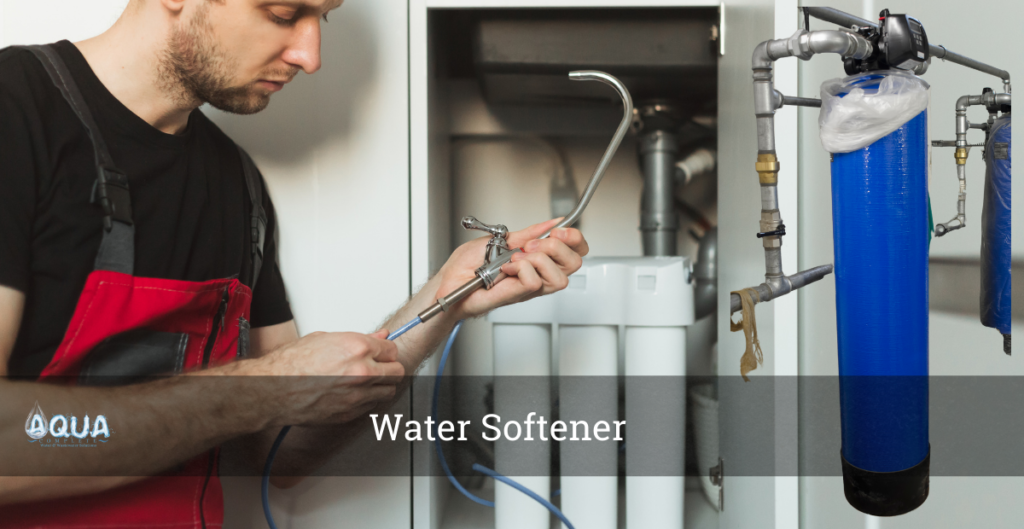What is a Water Softener?
A water softener is a device designed to remove hardness-causing minerals like calcium and magnesium from water. Hard water can cause scaling in pipes, reduce soap efficiency, and damage appliances. Water softeners help improve water quality by making it softer, which extends the lifespan of plumbing systems and enhances daily water usage experiences.

How Does a Water Softener Work?
Water softeners operate using a process called ion exchange to remove calcium and magnesium from water and replace them with sodium or potassium ions. The process includes several steps:
1) Water Enters the Softener Tank
- Hard water flows into the resin tank, which contains tiny resin beads.
- The beads are negatively charged and attract calcium and magnesium, which have positive charges.
2) Ion Exchange Process
- The resin beads trap calcium and magnesium ions and replace them with sodium or potassium ions.
- This process softens the water before it flows out for use.
3) Regeneration Cycle
- Over time, the resin beads become saturated with hardness minerals.
- The system flushes them out using a brine solution (saltwater), replenishing the sodium or potassium in the beads.
- The softened water is then ready for distribution.
Types of Water Softeners
Different industries and households require specific water softening systems based on their water usage. Below are the common types:
1) Salt-Based Ion Exchange Water Softener
✔ Traditional and widely used.
✔ Uses sodium or potassium ions for softening.
✔ Requires periodic salt refilling.
2) Salt-Free Water Conditioner
✔ Does not remove hardness minerals but prevents scaling.
✔ Uses a specialized filtration process.
✔ Ideal for people looking to avoid salt-based softening.
3) Dual-Tank Water Softener
✔ Best for continuous water softening.
✔ One tank regenerates while the other remains active.
✔ Perfect for high-demand households and industries.
4) Magnetic/Electronic Descaler
✔ Uses electromagnetic waves to alter mineral structure.
✔ Prevents scale buildup rather than removing minerals.
✔ Low-maintenance and eco-friendly.
Why Do You Need a Water Softener?
Installing a water softener provides several benefits, including:
✔ Prevents Scale Buildup – Reduces deposits in pipes, faucets, and appliances.
✔ Extends Appliance Lifespan – Protects water heaters, dishwashers, and washing machines.
✔ Saves Money – Lowers maintenance and energy costs by improving efficiency.
✔ Enhances Soap Effectiveness – Creates better lather with soaps and detergents.
✔ Improves Skin & Hair Health – Softer water prevents dryness and irritation.
✔ Reduces Water Spots – No more stains on glassware and bathroom fixtures.
Where Are Water Softeners Used?
Water softeners are useful in homes, industries, and commercial establishments where water hardness affects daily operations.
1) Residential Use
- Households install water softeners to improve water quality for bathing, laundry, and cooking.
- Helps in preventing damage to home appliances.
2) Industrial Use
- Used in boilers, cooling towers, and manufacturing plants.
- Ensures efficient machinery operation by preventing scale buildup.
3) Commercial Use
- Essential in hotels, restaurants, and hospitals where water quality impacts service quality.
- Soft water enhances cleaning processes and reduces maintenance costs.
How to Maintain a Water Softener?
Regular maintenance ensures the longevity and efficiency of a water softener. Here are some key tips:
✔ Refill the Salt Tank – Check salt levels every month and refill as needed.
✔ Clean the Resin Tank – Flush and clean the resin bed annually.
✔ Inspect the Brine Tank – Keep it free from salt bridges and blockages.
✔ Replace Filters – Some systems have filters that need periodic replacement.
✔ Schedule Professional Servicing – An annual check-up ensures optimal performance.
Choosing the Right Water Softener
Selecting the right water softener depends on various factors:
✔ Water Hardness Level – Test your water to determine the hardness level.
✔ Household/Industry Size – Choose a system based on daily water consumption.
✔ Type of Softener – Decide between salt-based, salt-free, or electronic descalers.
✔ Budget & Maintenance – Consider initial costs and ongoing maintenance expenses.
Final Thoughts
A water softener is a crucial investment for homes and industries that rely on clean, scale-free water. It helps protect appliances, save money, and improve water efficiency. By selecting the right type and maintaining it properly, you can enjoy the long-term benefits of soft water.
